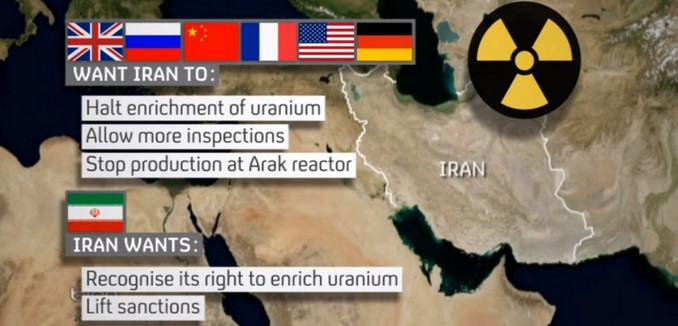National Journal reported this evening on statements emerging from the Senate regarding efforts by a bipartisan group of Senators to introduce new legislation that would impose sanctions on Iran should Tehran refuse, at the end of an upcoming six month negotiation period, to commit to sufficiently dismantling its atomic program so that it could no longer be used for pursuing nuclear weapons. An announcement on the proposed law is expected Thursday.
The Tower had earlier today conveyed statements from Sen. Mark Kirk (R-IL) expressing optimism regarding the prospects for such legislation. Kirk had specifically emphasized that he was cooperating closely Sen. Bob Menendez (D-NJ) on the proposed wording of a bill, and National Journal quoted Menendez updating reporters and officials on how the potential law was taking shape:
“I am working with a series of members, and I expect we’ll have some type of an announcement tomorrow,” Menendez said Wednesday. “The dynamics are what I’ve always said they would be, which is to give the president the space and time so that he can test the Iranians’ seriousness of purpose in terms of whether they are willing to strike an agreement, but to be ready should they ultimately fail.”
Reports indicate that lawmakers are responding to several dynamics surrounding stalled negotiations with Iran, many of which emerged clearly only in recent days and have deepened skepticism regarding Iranian intentions.
Under the terms of the Joint Plan of Action hammered out weeks ago in Geneva, a six month period was to take hold during which Iran would freeze progress on its nuclear program and the U.S. would lift some sanctions and refrain from imposing new nuclear-related sanctions. Under questioning from journalists, the State Department acknowledged days after the deal’s announcement that in fact the six month period had yet to begin, and that it wouldn’t start until Iran agreed on how to implement the JPA. Iran recently broke off the negotiations over the JPA’s implementation, and Agence France-Presse recently assessed that there was no end in sight for those talks. It had in the meantime Iran has continued to enrich uranium, pledged to bolster its plutonium production plant, and announced that it would test ballistic missiles.
The White House has nonetheless been heavily lobbying lawmakers to avoid imposing pressure on Iran during the so-called interim before the interim. Sources who spoke to National Journal implied that the Senate has had enough, and that ‘Iran’s temporary break-off in negotiations with world powers in Vienna last week has reinforced lawmakers’ doubts about Iran’s commitment.’ The bill is said to include options for a Presidential waiver, provided that the administration is able to certify that Iran is meeting its JPA obligations and negotiating in good faith in the context of a final agreement.
The Senate legislation will reportedly stake out positions both on the interim agreement and on what a final deal will need to include to satisfy US lawmakers. During the interim period, new sanctions would be imposed if Tehran violated the terms of the JPA, tested medium or long-range ballistic missiles which could eventually be used to deliver nuclear weapons, or was implicated in terror attacks against the United States anywhere in the world. Regarding a final deal, the legislation reportedly outlines tough sanctions should Iran refuse to substantially degrade its uranium and plutonium programs, both of which are widely thought to be involved in a drive for nuclear weapons. Senators will demand that Tehran meet the terms of the half-dozen binding United Nations Security Council resolutions demanding that it fully suspend those and other elements of its nuclear program.
Lawmakers more broadly have emphasized that the threat of future pressure will strengthen the administration’s hand in upcoming negotiations. Top Iranian officials have boasted that concessions granted under the JPA – which the White House insists are “limited, temporary, targeted, and reversible” – are actually extensive enough to “collapse” the sanctions regime. Analysts have expressed concerns that the Iranian boasts are justified, and have cited a range of reasons from administration under-counting of how much the relief is worth to a potential feeding frenzy which would see nations and companies rush back into the Iranian market.
Senators are also said to be responding to among other things a convergence of polling showing that as many as eight out of every ten Americans support lawmakers in maintaining or increasing sanctions on Iran as a comprehensive agreement is negotiated.
Meanwhile Iran has sought to frame any legislation threatening new sanctions after the JPA’s six-month window – i.e. of the kind likely to be considered by the Senate – as a violation of the U.S.’s commitment to refrain from imposing sanctions within the JPA six-month window. Tehran and those echoing its position have leaned heavily on asserting that such laws violate the “spirit” of the interim agreement.
Robert Satloff, executive director of the Washington Institute, tonight described the framing efforts as “unconnected to reality.” Satloff went on to imply that it was somewhat churlish to accuse the U.S. of violating the “spirit of Geneva” even as Iranian scientists continued to conduct activities which are at a minimum in severe tension with the agreement. The Tower assessed earlier this week that “tt is not clear why the Iranians believed that gestures toward the spirit of the JPA would have diplomatic of public purchase, inasmuch as Tehran has in recent weeks committed to enriching uranium, bolstering its plutonium production complex, and testing ballistic missiles – all actions which it insists are permitted under the letter of the JPA.”
[Photo: Channel 4 News / YouTube]




